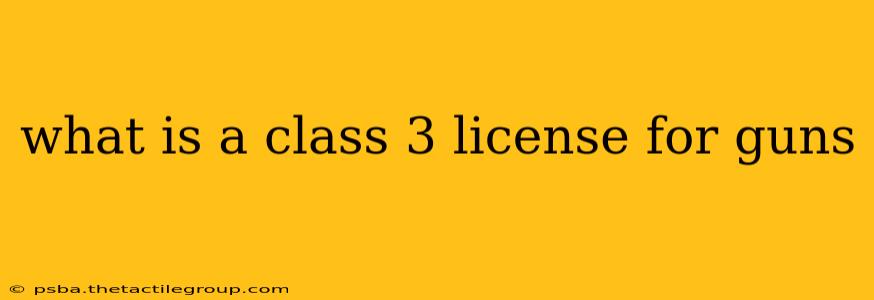The term "Class 3 license" is a colloquialism often used to refer to a license under the National Firearms Act (NFA) of 1934. It doesn't actually exist as an official designation, but it generally refers to the process of obtaining a license to legally own and possess certain types of firearms regulated under the NFA. These firearms are often referred to as "Class 3 weapons."
This article will clarify what a Class 3 license entails, the types of firearms it covers, and the stringent regulations involved in obtaining and maintaining one.
Understanding the National Firearms Act (NFA)
The NFA of 1934 regulates the manufacture, transfer, and possession of certain firearms deemed "dangerous" by the government. This includes items like:
- Machine guns: Automatic weapons capable of firing multiple rounds with a single trigger pull.
- Short-barreled rifles (SBRs): Rifles with barrels shorter than 16 inches.
- Short-barreled shotguns (SBSs): Shotguns with barrels shorter than 18 inches.
- Silencers (suppressors): Devices designed to muffle the sound of a firearm.
- Destructive devices: Generally defined as any device designed to cause damage through an explosive charge, including grenades, bombs, and certain types of rocket launchers. This also includes any firearm capable of firing projectiles exceeding .50 caliber.
Obtaining a Federal Firearms License (FFL) for NFA Items: The "Class 3" Process
The process of legally owning NFA items involves obtaining a Federal Firearms License (FFL). This isn't a separate "Class 3 license," but rather a specific type of FFL that allows you to deal in NFA items. This process involves a significantly more intensive background check and compliance requirements compared to obtaining a standard FFL for conventional firearms.
Here's a general overview of what's involved:
1. Application Process:
The application process requires meticulous attention to detail and complete accuracy. You'll need to:
- Complete ATF Form 7: This is the application for the FFL.
- Undergo a thorough background check: This will include fingerprints and a detailed review of your criminal history.
- Pay the application fee: The fee is subject to change.
- Meet specific eligibility requirements: These requirements are quite strict and eliminate individuals with certain criminal records, past drug use, or other disqualifying factors.
2. Compliance and Record Keeping:
Once you receive your FFL, strict compliance is mandatory. This includes:
- Maintaining detailed records: Accurate record-keeping of all NFA items purchased, sold, and possessed is crucial.
- Secure storage: NFA items must be stored securely, in accordance with ATF regulations.
- Regular inspections: Your business (if applicable) may be subject to periodic inspections by ATF agents.
3. Transferring NFA Items:
The transfer of NFA items is a complex process involving additional paperwork and background checks on the buyer. This is handled through the ATF's system, and typically involves a significant amount of waiting time.
The Costs and Considerations of Owning NFA Items
The costs associated with NFA items extend far beyond the purchase price of the firearm itself. You'll encounter:
- High initial costs: NFA items are inherently expensive.
- Significant transfer fees: Transferring an NFA item involves substantial fees paid to the ATF.
- Ongoing compliance costs: Maintaining your FFL and ensuring compliance with ATF regulations is an ongoing expense.
- Time commitment: The entire process, from application to transfer, can take months or even years.
Disclaimer: This article is for informational purposes only and should not be construed as legal advice. The laws surrounding NFA items are complex and subject to change. It's crucial to consult with legal counsel and the Bureau of Alcohol, Tobacco, Firearms and Explosives (ATF) for the most accurate and up-to-date information before attempting to obtain or possess any NFA regulated firearm. The information provided here is not a substitute for professional legal advice.

